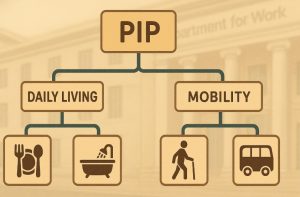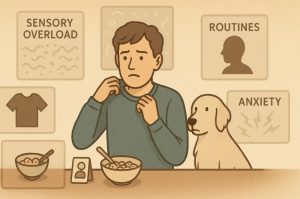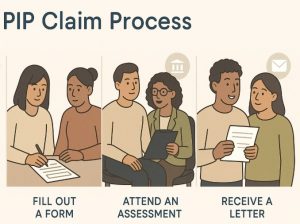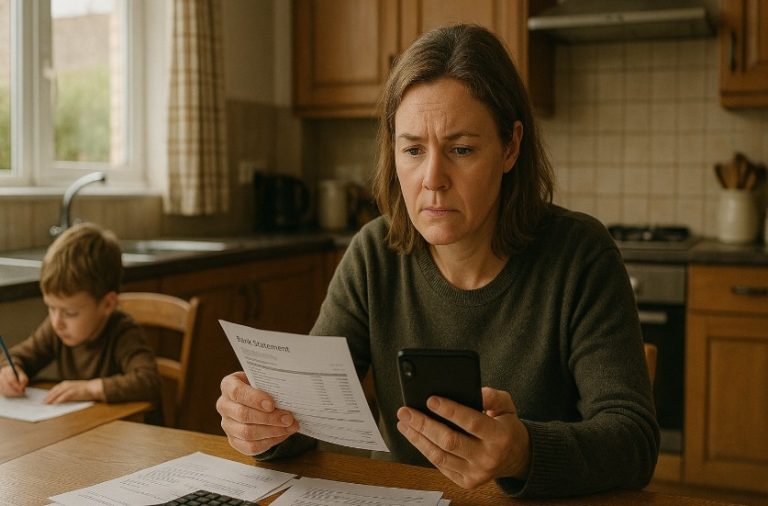Personal Independence Payment (PIP) is a government benefit in the UK designed to support individuals who have long-term health conditions or disabilities that affect their ability to manage daily tasks or move around.
One of the most commonly claimed conditions for PIP is autism. However, eligibility for PIP is not automatic upon diagnosis. Instead, individuals must demonstrate how autism affects their daily living and mobility.
What is Personal Independence Payment (PIP) and How Does It Work?

Personal Independence Payment (PIP) is a benefit that supports individuals aged 16 or over with long-term health conditions or disabilities.
It is designed to assist people who struggle with daily living tasks or mobility, regardless of income or employment status.
PIP is divided into two components:
- Daily Living Component: For individuals who need assistance with everyday activities such as preparing food, washing, or communication
- Mobility Component: For those who have difficulty planning or completing journeys or physically moving around
Each component is awarded at either a standard or enhanced rate, depending on the severity of the impact on the claimant’s life.
Eligibility is determined through a point-based assessment involving a form and a face-to-face, phone, or video consultation with a health professional.
Can You Qualify for PIP with an Autism Diagnosis?
A diagnosis of autism in itself does not automatically qualify someone for PIP. The Department for Work and Pensions (DWP) evaluates how the condition impacts the claimant’s ability to carry out specific tasks.
In 2024, autism was listed as the main disabling condition for over 198,000 PIP claimants in the UK. This makes it the second most common condition approved for PIP.
Applicants must provide evidence and examples demonstrating how autism affects their capacity to perform tasks consistently and safely.
Factors such as social anxiety, sensory overload, and difficulty with change can have a significant impact on eligibility.
How Does Autism Affect Daily Living and Mobility for PIP?

Autism is a lifelong neurodevelopmental condition that can significantly affect how a person perceives the world, communicates with others, and manages everyday tasks.
In the context of Personal Independence Payment (PIP), what matters most is not the diagnosis itself but the functional impact of autism on daily life and mobility.
When applying for PIP, the Department for Work and Pensions (DWP) will assess how a claimant’s autism affects their ability to complete a series of specified activities safely, repeatedly, in a reasonable time, and to an acceptable standard.
Daily Living Impact
The daily living component of PIP focuses on an individual’s ability to manage essential routine tasks. For many autistic people, these tasks are not just inconvenient they can be overwhelming or even impossible without support. These difficulties are often due to challenges with executive functioning, sensory processing, and social communication.
Preparing food
Autistic individuals may find it difficult to prepare food due to problems with sequencing, sensory aversions, or difficulty staying focused.
For example, someone might need prompting to follow a recipe step by step or assistance to ensure they cook safely, avoiding burns or undercooking food. A claimant might also experience anxiety when using kitchen appliances or have difficulty with planning what to eat.
Eating and Nutrition
Some autistic people have heightened sensitivities to texture, taste, or smell, which can limit their food choices. Others might under-eat or over-eat due to difficulties recognising hunger or fullness cues. This could lead to nutritional imbalance without ongoing monitoring or support.
Managing Medication or Therapy
Autism can affect an individual’s ability to adhere to a consistent routine, leading to issues with remembering medication timings or attending therapy sessions.
A person may experience anxiety over getting the routine wrong, which can result in distress or missed doses. In these cases, regular prompting or supervision might be required.
Personal Hygiene and Dressing
Sensory issues are often a significant barrier to washing and dressing. For example, the feel of water, pressure from a shower, or the texture of clothing fabrics can be distressing.
Some individuals may become fixated on the comfort of certain clothes and resist changing them, while others might not initiate hygiene routines without reminders or visual aids.
Toileting Needs
Initiating or sequencing toileting steps may require picture cards or prompting. In some cases, the individual may forget to complete all stages properly, potentially leading to hygiene or health issues.
Communication and Social Interaction
Face-to-face communication can be challenging. Autistic individuals may struggle with verbal processing, interpreting tone of voice, reading facial expressions, or understanding non-verbal cues. They may become overwhelmed during conversations and require another person to interpret or prompt their responses.
Reading and Understanding Information
Some autistic claimants may take longer to read written content or might misinterpret it, especially if it includes implied meaning or ambiguous language. Executive dysfunction can interfere with the ability to process and retain information, even for short durations.
Engaging with Others
Social situations can be mentally and emotionally exhausting. Interacting with unfamiliar people or in new settings may trigger anxiety or lead to shutdowns.
Some individuals may need someone to accompany them during social encounters to manage potential distress or help navigate interactions safely.
Making Financial Decisions
Many autistic individuals find it difficult to budget, prioritise spending, or deal with unfamiliar financial situations. While they might be able to pay a specific bill if shown how, managing a monthly household budget can be overwhelming without structured support.
Mobility Impact
The mobility component of PIP looks at how well a person can physically move and plan or follow a journey. For autistic individuals, the primary issues often fall within planning and following journeys, though physical movement might also be affected by anxiety or sensory distress.
Planning a Journey
Autism can impair the ability to plan routes, especially in unfamiliar areas. This is often linked to challenges with problem-solving, time perception, and working memory.
An individual might struggle to process variables such as traffic, timing, or changes to transport schedules. The fear of uncertainty and lack of routine can heighten anxiety, making even familiar trips stressful without support.
Following a Journey
Overstimulation in public places may result in a sensory overload, triggering a meltdown or shutdown. This can make it difficult to proceed or complete a journey safely.
Additionally, the individual may become confused or distracted and unable to navigate effectively without a companion. Severe social anxiety or panic attacks can also prevent them from leaving home unaccompanied.
Moving Around
Though many autistic individuals have no physical mobility impairments, the effects of extreme anxiety, coordination difficulties, or hypersensitivity to environmental stimuli can make it difficult to move around freely.
For instance, crowded spaces, loud noises, or bright lights might cause distress or disorientation, leading to a complete halt in movement until the environment is controlled or support is provided.
Real-World Examples of Functional Impact
To give context, the following examples highlight how autism can affect everyday activities assessed under PIP:
- Taking more than twice as long to get dressed because of discomfort with fabric textures and the need for a rigid routine
- Requiring a familiar person to be present when shopping to prevent sensory overload and difficulty processing prices and instructions
- Becoming unable to complete a journey alone due to fear of unfamiliar routes, changes in plans, or sudden environmental stimuli
- Needing step-by-step prompting for basic meal preparation due to focus issues and difficulty multitasking
These examples illustrate that, while an autistic individual might be physically capable of certain tasks, the mental, emotional, and sensory load makes the activities unmanageable without assistance. This is the basis on which PIP points are awarded.
What Steps Are Involved in Claiming PIP for Autism?

Claiming PIP follows a structured application process. Each stage requires attention to detail and timely responses to ensure your application progresses smoothly.
Initial Phone Call
Start your claim by contacting the PIP Enquiry Line at 0800 917 2222. During this call, your basic details are collected and the claim is officially registered. This is known as the PIP1 stage.
Completing the PIP2 Form
Shortly after the call, you’ll receive the “How Your Disability Affects You” form, commonly known as the PIP2. This form requires detailed answers about how your autism impacts your life. Questions are grouped under daily living and mobility categories. Be as descriptive as possible.
Include:
- Specific examples of challenges and support needs
- Information about good and bad days
- Mention of any co-occurring conditions such as anxiety or ADHD
Attending a Health Assessment
Most claimants are required to attend an assessment conducted by a health professional. This may be held in person, over the phone, or via video call.
The assessor will ask questions based on the PIP2 form. It is important to give consistent answers and reiterate how your condition affects your functionality, not how it feels emotionally.
What Should You Include in Your PIP Application for Autism?
When completing your application or attending an assessment, focus on the impact that autism has on your ability to complete specific tasks.
Avoid simply listing your diagnosis. Instead, describe:
- The type of support you need (e.g., prompting, supervision, physical help)
- How often you need help
- What could happen if you don’t receive help
If you have other conditions, ensure they are included in your application. Conditions like generalised anxiety disorder, OCD, or depression can contribute to the functional limitations you experience.
Providing supportive evidence is critical. This can include:
- Letters from healthcare professionals
- Reports from social workers or therapists
- A daily diary showing how symptoms fluctuate
These strengthen your claim by verifying your experiences through reliable third-party accounts.
What Tips Can Help You Succeed in Your PIP Claim?
While the process can be challenging, there are practical strategies that can improve your chances of receiving an appropriate award.
- Get support when completing the form, either from a friend, carer, or professional advocate
- Be detailed but focused; avoid vague terms like “sometimes” and instead use phrases like “most days” or “four times a week”
- Maintain copies of everything you submit and any correspondence from the DWP
- Use a diary to document your daily struggles and how they align with the PIP descriptors
Being prepared for your assessment can also make a significant difference. Knowing how questions are framed and what assumptions might be made about your answers allows you to present your situation clearly.
How Much Can You Get from PIP for Autism?
The PIP award is determined by the number of points accumulated in each component. Each activity is assessed, and points are awarded based on the level of difficulty the applicant has.
Current PIP Award Rates (April 2024)
| Component | Standard Rate | Enhanced Rate |
| Daily Living | £72.65 | £108.55 |
| Mobility | £28.70 | £75.75 |
A person who qualifies for both components at the enhanced rate receives £184.30 per week. This is tax-free and can be paid alongside most other benefits. It may also unlock access to other support such as:
- The Motability scheme
- Carer’s Allowance (for carers)
- Increases in other entitlements like Housing Benefit or Universal Credit
Where Can You Get Help With a PIP Application for Autism?

Multiple organisations in the UK provide advice and support to individuals applying for PIP, especially those with neurodevelopmental conditions like autism.
Some sources of help include:
- National Autistic Society: Offers benefits guidance tailored to autistic individuals
- Citizens Advice: Provides free advice on completing the form and preparing for assessments
- Benefits and Work: Offers in-depth, membership-based guides and tools
- Disability Rights UK: Publishes accessible information about PIP and appeals
- Local councils: May offer advocacy services or link you with local support groups
Using these resources can provide clarity and support throughout your application, especially if you’ve struggled to apply in the past.
What Are Common Misconceptions About PIP and Autism?
Several common myths about PIP and autism can prevent people from applying or lead to misunderstandings about the process.
| Misconception | Reality |
| A diagnosis guarantees PIP approval | You must show functional impact, not just have a diagnosis |
| You must be non-verbal or severely disabled | PIP assesses need, not visibility or severity in appearance |
| Mild autism isn’t eligible | Even mild autism can qualify if it affects daily living or mobility |
| You must be completely unable to do tasks | Difficulty, repetition, safety, and time taken all factor into scoring |
Understanding these realities can help potential claimants prepare their application with accurate expectations.
Final Thoughts
Absolutely. While the process can be lengthy and sometimes frustrating, the support offered through PIP can significantly improve the quality of life for autistic individuals.
With a strong understanding of how to present your case, a focus on daily challenges, and the right support, your chances of success increase considerably.
FAQs About Claiming PIP for Autism
How long does it take to get a decision on a PIP claim?
The average processing time is 12 to 18 weeks from the date of initial application, though this can vary depending on demand and complexity.
Can a child with autism receive PIP?
No. PIP is for individuals aged 16 and over. Children under 16 may be eligible for Disability Living Allowance (DLA).
Do I need a formal autism diagnosis to apply?
While a diagnosis helps, it is not legally required. What matters is the documented functional impact on daily living or mobility.
What happens if my condition changes after I start receiving PIP?
If your condition significantly improves or worsens, you must notify the DWP. This could lead to a reassessment and potential change in award.
What kind of evidence is most helpful for PIP claims?
Professional reports (GP, psychologist, occupational therapist), support worker letters, and a daily diary are highly effective in demonstrating impact.
Can I claim PIP if I have mild autism?
Yes, if your mild autism still causes significant difficulties with the listed daily living or mobility tasks.
Is there any free help available for completing the PIP form?
Yes. Organisations like Citizens Advice, NAS, and local disability support services can help you complete the form accurately.






